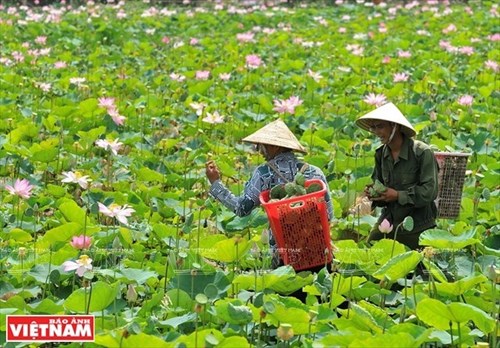Most popular tourist attractions could be named as Tram Chim national park, Xeo Quyt relic site, Gao Giong and Dong Sen Thap Muoi eco-tourism sites, Sa Dec flower village, and dozens of community-based and homestay destinations.
Tram Chim national park is considered the “green lung” of the Mekong Delta, spanning more than 7,300 hectares in Tam Nong district. It is home to 250 species of water birds, 100 species of freshwater fish and 190 species of plants. It is the fourth Ramsar site (Wetlands of International Importance) in Vietnam and the 2000th in the world.
Director of the park Le Hoang Long said visitors can join tours to try their hands at daily activities of local farmers such as catching fish using nets and harvesting wild rice. They can also visit birds in their breeding season.
Located in Cao Lanh district, Xeo Quyt relic site used to be a revolutionary base during the resistance wars against France and the US. Visiting the boundless cajeput forest in the Plain of Reeds (Dong Thap Muoi) by boat is really an interesting excursion.
    |
 |
|
A highlight in the local tourism map is Dong Sen Thap Muoi (lotus field) in Thap Muoi district |
Gao Giong ecotourism area in Cao Lanh district is known as a “green oasis” with marvelous natural scenery. The mangrove forest in Gao Giong is the habitat of many species of water birds such as whistling ducks, wild ducks, and white egrets. Visiting the bird sanctuary in the early morning or late afternoon would be a wonderful experience for any nature lovers.
A highlight in the local tourism map is Dong Sen Thap Muoi (lotus field) in Thap Muoi district. Visitors could join numerous activities like sailing a boat to pick lotuses, going fishing, and tasting dishes made from lotus.
Another must-see destination is Sa Dec flower village in Sa Dec city, which is regarded as a land of hundreds of uncanny flowers and strange herbs. With the aim of becoming a flower city in the southern region, Sa Dec has launched a green tourism model at the flower village housing more than 2,000 flora species across 470 hectares.
Besides the aforesaid attractions, many households in the province have spent big on community-based tourism development and homestay services.
Tourists could engage in various activities such as picking fruits at the local orchards, bathing in pond, playing wire-walker through river, and catching fish.
Deputy Director of the provincial Department of Culture, Sports and Tourism Ngo Quang Tuyen said the locality will focus on developing ecotourism, farming experience tourism, and culture, historical and spiritual tourism.
In 2017, Dong Thap welcomed over 3.3 million tourists, earning VND 684 billion (USD 30.3 million) in revenue, showing a year-on-year increase of 178 percent and 215 percent respectively.
Source: VNA